John Richardson thought he’d found a cure for cancer.
The San Francisco Bay Area doctor had been giving patients a therapy that is essentially a chemical compound found in apricot kernels and known by several names — laetrile, amygdalin, vitamin B17. Richardson had been told it could attack tumors, naturally and precisely. It can also convert into potentially poisonous amounts of cyanide when eaten. But Richardson was a true believer.
“Yes, the evidence that Vitamin B17 is nature’s control for cancer is quite overwhelming,” he wrote in his book. “So the next time you hear an official spokesman for orthodox medicine proclaim that there is none, you might tell him that such a statement is a ‘self-evident absurdity’ and suggest that he do his homework before posing as an expert.”
Less convinced were the police who, on June 2, 1972, barged into Richardson’s clinic and jailed him on charges of medical quackery. He eventually lost his medical license and was charged with smuggling laetrile, an illegal drug, into the country.
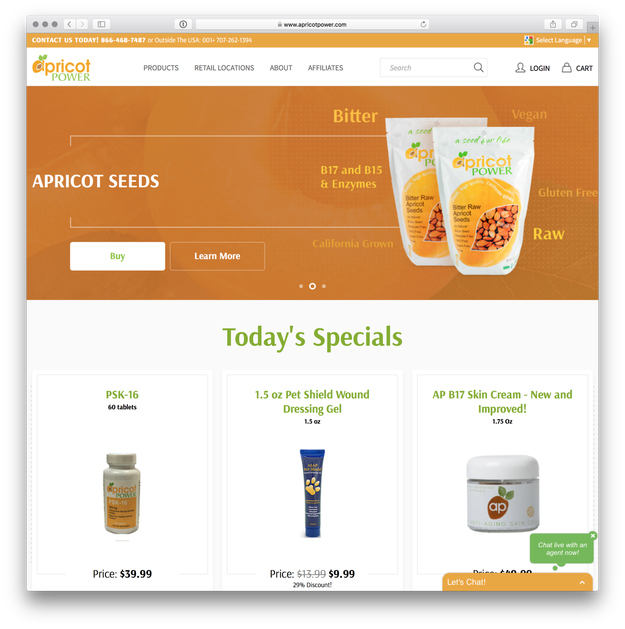
Apricot Power / Via apricotpower.com
Now, three decades after Richardson’s death, his son, John Richardson Jr., is no stranger to apricot seeds. Through Apricot Power, his thriving e-commerce store, he sells bitter seeds ($32.99 for 1,500), seed extract-based tablets (up to $97.99 a bottle), and B17-infused anti-aging cream ($49.99). Recipes for apricot-seed pesto, egg nog, and marzipan offer a “delicious and easy” way to work the supposed superfood into your diet, and videos explain why the site’s mission is to “get B17 into every body!” Though Richardson Jr. won’t reveal revenue numbers, he says his family operation of around 10 employees has served “thousands” of customers all over the world since it launched in 1999.
But there’s a key difference between his business and his father’s, Richardson Jr. told me: “We don’t mention the C-word in our company.” Cancer, that is. If a customer review on Apricot Power’s website even mentions the term, the company leaves a comment pointing out that it doesn’t make any disease or illness-related claims about its products. Legally, it can’t: The FDA prohibits companies from selling laetrile, under any name, as a cancer treatment, because studies have found it to be at best ineffective, and at worst toxic.
Of course, that doesn’t stop dozens of internet entrepreneurs from exploiting regulatory loopholes to sell apricot seeds and B17 tablets, no claims attached — and profiting off the efforts of believers who spread the “truth” about them far and wide. In laetrile’s heyday in 1981, a doctor called it “the slickest, most sophisticated, and certainly the most remunerative cancer quack promotion in medical history.” Three decades later, the internet has only spread the gospel, creating an unstoppable, hydra-headed ecosystem of buyers and sellers.
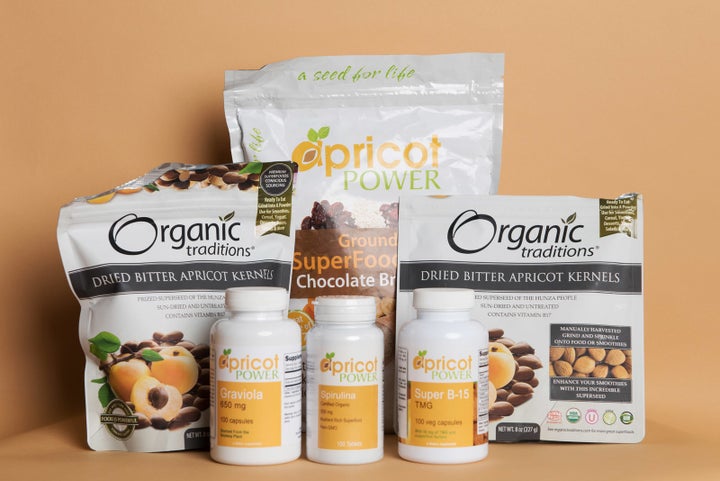
A variety of apricot seed products available online.
BuzzFeed News
If you’ve never heard that apricot kernels kill and prevent cancer, that’s because the government doesn’t want you to, proponents say. Cancer, according to them, arises from the lack of a nutrient they call vitamin B17, so it follows that ingesting that nutrient would fight the disease. But regulators, pharmaceutical companies, and doctors can’t patent and profit from a natural substance. So they keep it off the market and peddle toxic, invasive, costly, and unnatural chemotherapy and drugs at patients’ expense.
The internet has created an unstoppable, hydra-headed ecosystem of B17 buyers and sellers.
Or so the theory goes. “Vitamin B17 Is Banned Because It Treats Cancer!” a post on the site Healthy Food House proclaims; it has been liked, commented on, and shared on Facebook more than 47,000 times since September, according to the social media–tracking tool CrowdTangle. A post about “the real story of laetrile,” published on a site called The Truth About Cancer, has gotten more than 44,000 likes, comments, and shares since June 2015.
Yin Ling Woo, a gynecological oncologist, recently had to decline when three cancer patients asked her to inject them with liquid B17 vials. “They buy it off the internet, it arrives, they have to get someone to administer it,” said Woo, who works in Kuala Lumpur, Malaysia.
Over the last year and a half, public health agencies in the European Union, Canada, and Dubai have issued warnings about apricot kernels and kernel-derived supplements. Since Australia and New Zealand outright blocked the sale of raw kernels in late 2015, retailers have been fined for continuing to sell them. In April, the FDA fired off warning letters to the sellers of more than 65 illegal cancer treatments, including whole apricots and vitamin B17. All the regulators cite the internet as the main source of the problem. “Due to the nature of online marketing, some companies attempting to avoid compliance with FDA law simply start new websites and rename fraudulent products,” an FDA spokesperson told BuzzFeed News in an email.
In other words, the FDA lacks the power to systematically fix the underlying issue. It can go after apricot kernels advertised as a cancer cure. But it can’t crack down when they’re advertised as supplements or plain old seeds. Nor can it control the Facebook posts, YouTube videos, blogs, and tweets that perpetuate the myth.
And when the FDA calls out problematic claims, all a company has to do to escape scrutiny is stop using the phrases in question. “But the misimpression that their product is an effective cancer cure will remain out there, uncorrected, in the public eye,” said Patti Zettler, an associate professor at Georgia State University’s law school and a former associate chief counsel at the FDA.
It’s no coincidence that B17 is enjoying a second life online, at this moment in time. The internet is rife with misinformation about science and health, and the nutritional supplements business — as part of the larger “wellness” industry — is worth billions. Meanwhile, cancer remains a little understood disease that causes nearly 1 in 6 deaths worldwide. So in a way, it’s comforting and intuitive to blame a fixable vitamin deficiency. It’s also wrong.
Felicity Corbin-Wheeler of Jersey, an island south of England, credits B17 injections and a strict diet with shrinking her pancreatic cancer in 2003. She refused chemotherapy, which aligns with her belief that the “Western diet has been so hijacked by processed foods, sugars, fats, and salts.”
“I’m all for the natural things,” she said, “that we get back to a simple life.”
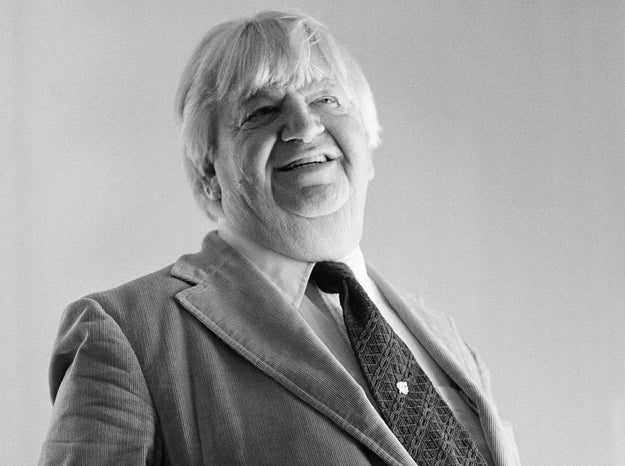
Ernst T. Krebs Jr., seen in San Francisco in 1980, was an early promoter of laetrile as a cancer treatment.
Sakuma / AP Photo
A successful salesperson must buy into what they’re selling, and Richardson Jr. is all in. Growing up in the Bay Area suburb of Orinda, he and his seven siblings weren’t fed sugar or processed wheat, an abstention he keeps up to this day. He says he started eating apricot seeds for his health at age 5. Now 52, he’s up to 40 a day.
The seeds contain amygdalin, a compound also found in apple seeds and almonds. In the 1950s, Ernst T. Krebs Jr., a self-described doctor and biochemist with no medical degree, patented a purified form of amygdalin that he called “laetrile.” He also promoted it as “vitamin B17,” although it’s not an officially recognized vitamin.
In 1971, Krebs Jr. shared with the elder Richardson his theory of how this nutrient could stop cancer growth. As Richardson later summarized: “[N]ature’s mechanism will not work if one fails to eat the foods that contain this necessary vitamin, which is exactly what has happened to modern man, whose food supply has become further and further removed from the natural state.”
In Richardson’s day, “laetrilists” were just as controversial as the anti-vaccine movement is today. In the 1960s, the FDA banned laetrile and reported that there was no evidence it treated cancer. But over the next decade, more than 70,000 Americans took it anyway. Many of them crossed into Mexico for injections denied by their stateside doctors. Actor Steve McQueen secretly traveled to Baja in 1980 to receive laetrile, among other alternative remedies, for an advanced lung cancer. He died months later. In the mid-’70s, a scientist at Memorial Sloan Kettering Cancer Center performed experiments that he said showed laetrile helped reduce tumors in mice. A media relations staffer then leaked the data, claiming that hospital executives had sought to cover up and discredit it. He’s been making that claim ever since, including in the 2014 documentary Second Opinion (“for the conspiracy-minded only,” the Los Angeles Times wrote), and now charges cancer patients $500 for hourlong phone consultations.
In the mid-'70s, “laetrilists” were just as controversial as the anti-vaccine movement is today.
When the elder Richardson was arrested in 1972 (on charges that were dropped), it prompted his fellow members of the John Birch Society, the far-right conspiracist group of the era, to start a lobbying group to legalize laetrile. Later, Richardson was fined $20,000 and placed on probation on charges of conspiracy to smuggle laetrile from Mexico to the US. Indictments against him and 18 other accused promoters noted that he had deposited $2.5 million in his bank account over two years.
Even so, Richardson Jr. remembers his father, who died in 1988, as “very principled, very honest, and very moral,” and keeps a picture of him over his desk. “There’s still people that contact me and tell me what a wonderful man he was and what a wonderful doctor he was,” he said.
After long legal battles, the FDA’s laetrile ban ultimately took effect in 1987. In 1999, Richardson Jr. started Apricot Power as an online-only store, but it’s branched out to health food shops over the last five years to meet customer demand. The company sources apricots from its farm and others in California, removes the flesh, air-dries the pits at the center, cracks them open, and sells the seeds inside.
“A lot of the foods, the amygdalin’s been cooked out of it,” said Richardson Jr., who also operates a real estate firm and a restaurant. “And my dad believed a normal, healthy person should have 100 milligrams a day of amygdalin. That’s been our company motto since the beginning, is just getting amygdalin back into every body.”
It took me no more than a few seconds to find apricot seeds online. A Google search led me to Amazon, where a European vendor was selling a 1-pound bag for $19.99 with this caveat: “We do not ‘treat’, or aim to ‘cure’ any disease.” Still, its customers leave reviews like “Raw Apricot Kernels help to stop Cancer in its tracks” and “I expect no miracles, but I don’t want to die from chemotherapy.” The seeds turned out to be chewy and tongue-curlingly bitter, with a long and unpleasant aftertaste.
Amazon’s algorithm recommended that I also buy the book that’s the bible of this movement: World Without Cancer: The Story of Vitamin B17. First published in 1974 and now in its 24th printing, it’s by G. Edward Griffin, who has no scientific training, denies HIV, and pushes Sept. 11 conspiracy theories.
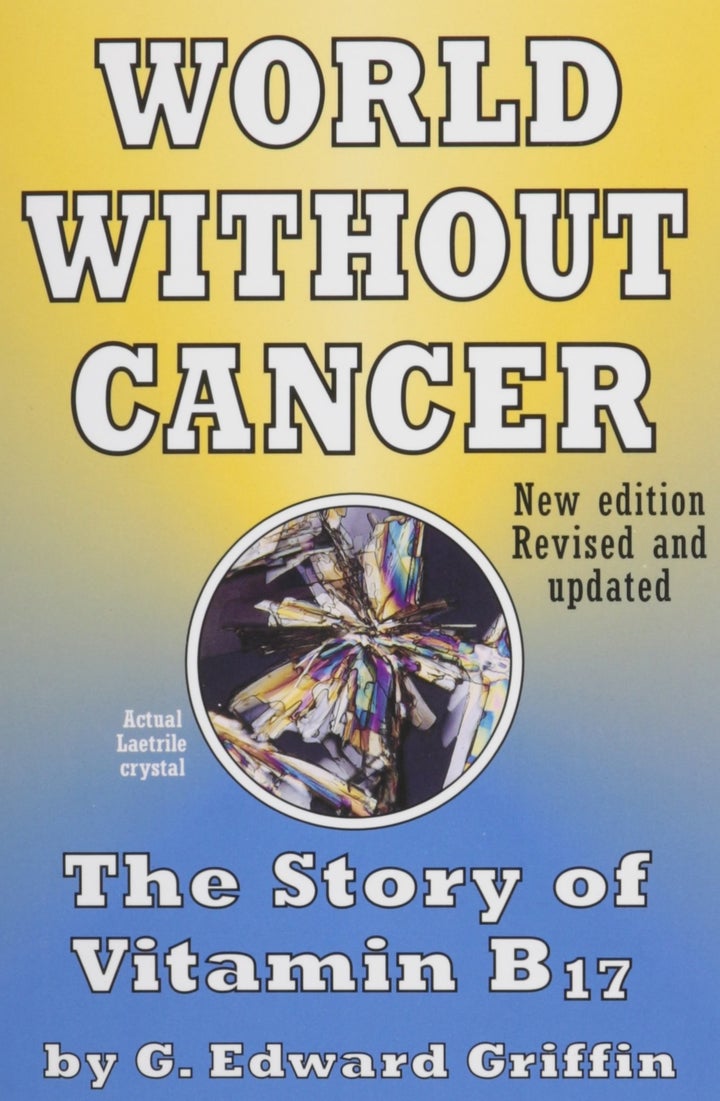
Via amazon.com
I tried to interview more than 35 e-commerce shops that sell seeds or supplements labeled as laetrile, amygdalin, or B17. Many declined to talk or never got back to me. A man at Raw Foods and Vitamins turned me down, explaining, “The FDA and the government agencies have gone wild, there’s so much money in Big Pharma. … As soon as there’s a little publicity, they’ll be all over you.” He did, however, text me pro-laetrile books and websites to look up.
Others were more open. Danny Hesman, who runs B17 USA full-time out of Los Angeles, said he has 5,000 repeat customers. “I do tell people it’s not a magic pill,” he said. But like some other vendors, he’s had a personal experience with cancer — in his case, a friend who died from it. “I got a front-row seat to the suffering he went through with modern medicine,” he said. “I know these oncologists, I spoke to their team, they did everything. It’s almost career suicide for professionals to even consider alternative therapies, which leaves [B17] in that fringe zone you see when you google ‘vitamin B17.’ I wish there were some more professionals that would really work on that.”
Many vendors, especially those in the US, repeatedly emphasized that they weren’t claiming to cure, treat, or prevent anything, as if the FDA were listening over the phone. But Our Father’s Farm in Ontario, Canada, sells kernels that “may help with cancer prevention and symptoms.” Vision B Seventeen in Kuala Lumpur, Malaysia, claims to have “been successfully treating cancer and other degenerative diseases for more than 12 years now.”
Regulators have tried to squash these kinds of vendors. Jason Vale, a professional arm wrestler in New York City, sold seeds as a cure on his website, Apricots From God, because he believed they’d healed his kidney cancer. He also spammed people with millions of email ads. But in 2003, Vale was sentenced to five years in prison for criminal contempt of a court injunction sought by the FDA to stop him selling.
“Laetrile (i.e. Vitamin B17) therapy is one of the most popular and best known alternative cancer treatments.”
Quelle: <a href="These People Are Making Money Off A Bogus Cancer Cure That Doctors Say Could Poison You“>BuzzFeed
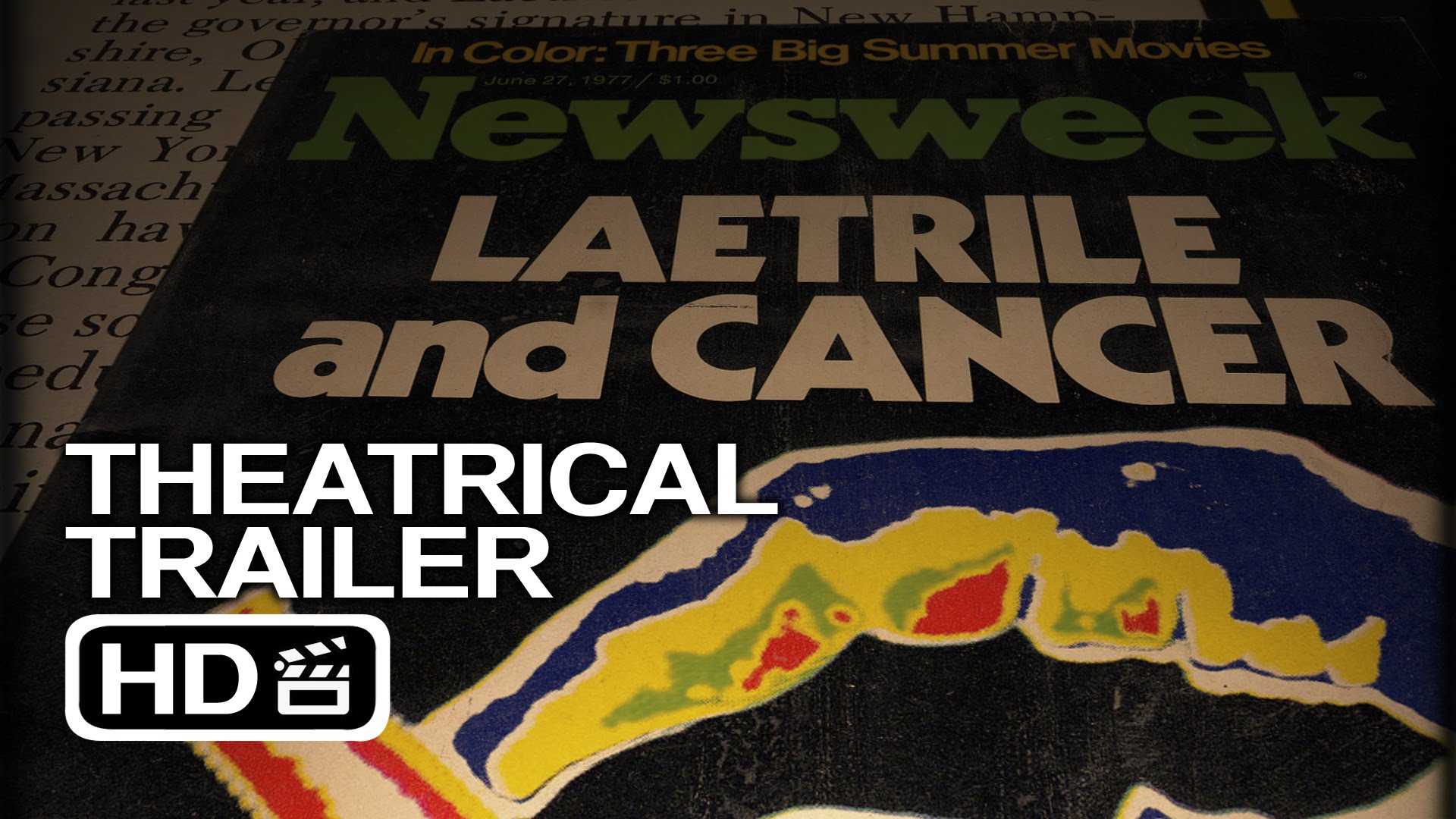
Published by